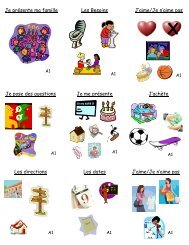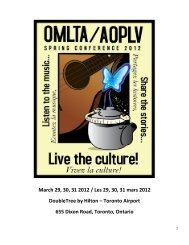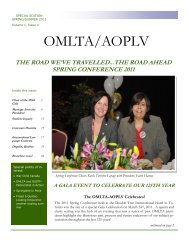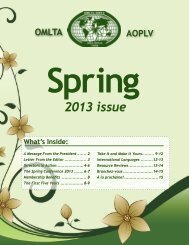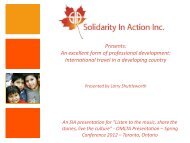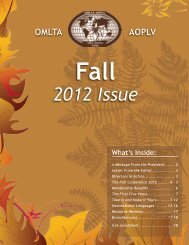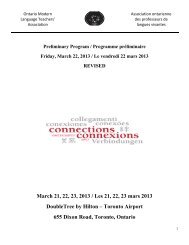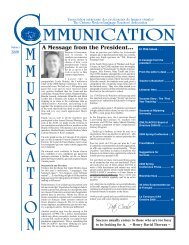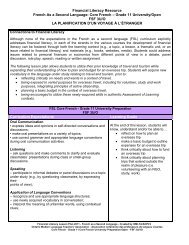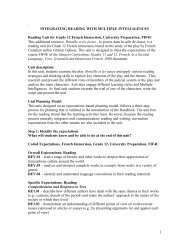OMLTA/AOPLV - Ontario Modern Language Teachers
OMLTA/AOPLV - Ontario Modern Language Teachers
OMLTA/AOPLV - Ontario Modern Language Teachers
You also want an ePaper? Increase the reach of your titles
YUMPU automatically turns print PDFs into web optimized ePapers that Google loves.
<strong>OMLTA</strong>/<strong>AOPLV</strong><br />
VOLUME 1, ISSUE 2<br />
AUTUMN-AUTOMNE 2010<br />
FALL ISSUE<br />
COMMUNICATION<br />
Happy New Year! Meilleurs vœux! I wish you all a happy, healthy and<br />
peaceful New Year.<br />
Just before publishing the fall edition of Communication<br />
our President, Susan Forester accepted a<br />
position as Education Officer with the Field Services<br />
Branch of the Ministry of Education. Unfortunately,<br />
this means that she can no longer hold the<br />
position of President. Therefore, according to the<br />
<strong>OMLTA</strong> constitution, the First Vice President will<br />
assume this role until the Annual General Meeting<br />
in March 2011.<br />
For the past months prior to accepting her position at the Ministry, Susan<br />
dedicated her time to the <strong>OMLTA</strong> organization. Along with our members and<br />
partners, we express our deep gratitude to her and wish her well in her future<br />
career path. Please see below the message that she wrote for our teachers in<br />
September.<br />
Since I am assuming the role of President, I would like to take this opportunity<br />
to introduce myself to the members. My name is Faten Hanna and I have<br />
been involved with the organization for six years. During my time here, I<br />
have worked in a variety of capacities, such as Editor of Communication for<br />
three years, also I was the Chair of last year's Spring Conference, so I hope<br />
continued on page 2<br />
RANDONNEE INOUBLIABLE!<br />
This year‘s Projet à Québec was another huge success. Arriving in Quebec City on<br />
July 19, 2010, 39 participants spent the next 12 days living, eating, learning and<br />
enjoying life in French. Mornings were spent in class with instructors Mel Shea<br />
and Julie Theberge, learning about the rich French culture of the Québécois. Songs,<br />
poems, vocabulary and idiomatic expressions were shared by these two animated<br />
instructors. As well, they shared new teaching strategies, ideas, and pedagogy with<br />
these teachers, who gave up two weeks of their summer vacation to renew their<br />
passion for the French language. continued on page 3<br />
Inside this issue:<br />
Projet a Quebec 3<br />
Message from the Past President 6<br />
Celebrating our 125thanniversay 8<br />
Concours 9<br />
CEFR for <strong>Language</strong>s 11<br />
International <strong>Language</strong> Contests 16<br />
<br />
<br />
SPECIAL POINT OF INTEREST<br />
COMMON EUROPEAN FRAME-<br />
WORK of REFEERENCE for LAN-<br />
GUAGES<br />
INTERNATIONAL LANGUAGE<br />
CONTESTS 2010
continued from page one<br />
that I have met many of you or at least you will remember seeing me. I look forward to continuing the<br />
wonderful work started by Susan and to serving the organization in the coming months.<br />
C‘est dans cet esprit d‘avancement et de développement, j'en profite pour vous souhaiter Paix, Santé et<br />
Bonheur. Que l‘année 2011 soit généreuse pour chacun d‘entre vous et tous ceux qui vous sont chers.<br />
Have a healthy and peaceful new year<br />
Faten Hanna<br />
Interim President<br />
<strong>OMLTA</strong>-<strong>AOPLV</strong><br />
MESSAGE FROM THE EDITORS<br />
Some unexpected changes at the administrative level of <strong>OMLTA</strong> resulted in a delayed release<br />
of this issue. We hope that you will enjoy it and look forward to releasing the winter issue<br />
shortly. We wish all members of the <strong>OMLTA</strong> executive the best of luck in their new positions<br />
and look forward to working with them to promote the teaching of second languages in <strong>Ontario</strong>.<br />
We would also like to express congratulations to Susan Forrester in her new position at<br />
the Ministry of Education.<br />
Kim Lundquist, Editor<br />
Pina Viscomi, Editor, International <strong>Language</strong>s<br />
Heather Henke, Photographer
PROJET A QUEBEC<br />
Continued from page one<br />
Les après-midis étaient remplis de<br />
tours des sites historiques et culturelles<br />
de la ville de Québec. De l‘hôtel<br />
de ville au musée des beaux-arts,<br />
de la Citadelle au musée de l‘Amérique<br />
française, à Tadoussac qui se<br />
trouve où la rivière Saguenay rencontre<br />
le fleuve St Laurent, la plupart<br />
des tours étaient guidés par un guide<br />
fantastique, qui partageait joyeusement<br />
sa ville avec nous. When not<br />
actively participating in organized<br />
activities, participants had the opportunity<br />
to explore the city on their<br />
own, finding wonderful works of<br />
art, entertaining street buskers,<br />
lovely shops and to the delight of<br />
most, fabulous food!<br />
There is so much to see<br />
and do during these<br />
free periods that it was<br />
impossible to cram<br />
everything in during<br />
these two weeks.<br />
The bonding and feelings of accomplishment<br />
were completely unexpected<br />
by some of the participants.<br />
THE FIRST100...<br />
AND COUNTING!<br />
They did not realize that this commitment<br />
of two weeks would forever<br />
change their lives.<br />
They have found new<br />
friendships, new<br />
sources for ideas and<br />
most importantly,<br />
they no longer feel<br />
alone as sometimes,<br />
the only French teacher in their<br />
school. They now have a<br />
support system they can turn to<br />
when the going gets tough and they<br />
feel isolated. Without fail, all 39<br />
participants were invigorated and<br />
renewed by these two incredible<br />
weeks. They are happily awaiting<br />
the beginning of school so that they<br />
can share their<br />
with their students<br />
their love of the French<br />
language and culture.<br />
Hopefully, Projet a<br />
Quebec will continue<br />
to be offered each year,<br />
allowing more and<br />
more French as a second<br />
language teachers an opportunity<br />
to form this<br />
same support system as<br />
our first 100 participants<br />
have found.<br />
by Janet Smith<br />
Page 3<br />
OMLT A /A OPLV
UNE RANDONNÉE INOUBLIABLE<br />
Hear it first hand….letters from our participants.<br />
Je me sens vraiment privilégiée d‘avoir participé au programme de Projet à Québec l‘été dernier. Je<br />
n‘oublierai jamais cette expérience! Puisque le français n‘est pas ma langue maternelle, je cherche toujours<br />
des occasions à apprendre et à améliorer mon français. Le Projet à Québec m‘a donné l‘opportunité<br />
de pratiquer la langue française et de la vivre. Maintenant, je me sens beaucoup plus à l‘aise en parlant<br />
le français et j‘aurai plus de confiance comme enseignante de la culture québécoise. On a étudié<br />
des chansons, visité des musées, appris des expressions et coutumes québécoises, et discuté de stratégies<br />
pour incorporer tous ces éléments dans la salle de classe. Ce qu‘on a appris n‘est pas facile à apprendre<br />
en <strong>Ontario</strong> en lisant des livres ou des articles. Il faut vraiment vivre dans un milieu français<br />
pour apprécier et apprendre tous les aspects de la culture. Ce projet nous a donné cette possibilité.<br />
Puisque plusieurs enseignants de français langue seconde sont des anglophones, comme moi, il y a un<br />
besoin de programmes comme ceci pour donner plus de confiance en classe. Je voudrais vous remercier<br />
de votre soutien dans ce programme et j‘espère que ce programme va toujours continuer à offrir<br />
une occasion de vivre la langue française. C‘est vraiment un programme inoubliable et extrêmement<br />
utile pour les enseignants de FLS.<br />
Kerri Braido<br />
Algoma District School Board<br />
Sault Ste Marie<br />
letters continued on next page<br />
V OLU ME 1, ISS UE 2 Page 4
Letters from the participants cont’d from page 4<br />
Projèt à Québec 2010 était une expérience inoubliable! En arrivant à l’aéroport de Toronto, j’ai rencontré<br />
immédiatement des profs de français qui faisait partie de la groupe de 40 personnes qui ont<br />
été choisi pour le programme. Le premier jour était<br />
ouvert pour s’installer à la résidence de l’université de Laval et pour rencontrer le groupe entier avec<br />
les organisateurs. On a commencé un peu timidement, mais après les premiers trois jours les<br />
représentants acceuillants de Perspectives et d’<strong>OMLTA</strong><br />
nous ont fait sentir à l’aise l’un avec l’autre. Les jours après, on a collaboré ensemble chaque matin<br />
pour améliorer notre français et pour partager des idées d’apprentissage. Cependant chaque aprèsmidi<br />
on a voyagé au centre ville pour aller aux<br />
musées, la citadelle et pour parler avec les gens locaux. C’était tellement rafraîchissant de parler tout<br />
le temps en français du matin au nuit car à l’école je suis encerclée d’anglais. On est aussi allé à<br />
Tadoussac pour voir les baleines, et je pense<br />
que c’était là où no<br />
tre groupe a vraiment commencé à devenir une vraie famille. J’ai l’intention de garder connaissance<br />
avec les amis que j’ai rencontré à la belle province. Je recommande fortement ce programme à tous<br />
ceux qui veulent une bouffée d’air frais!<br />
Danielle Black<br />
Page 5<br />
OMLT A
Message from Susan Forrester,<br />
Past President, <strong>OMLTA</strong><br />
Bonne rentrée à tous les professeurs de langues vivantes! As an educator, you may agree with me that<br />
the Monday of Labour Day weekend is a more appropriate date than December 31st to be wishing our<br />
colleagues "Happy New Year" or "Bonne année!". Many of us have traditional celebrations to mark the<br />
end of summer and the beginning of a new school year. I have often found that, after spending countless<br />
hours during those last precious days of summer preparing lessons, and assessments, and then putting<br />
the final touches on the classroom to create a welcoming and inspiring environment for my new<br />
students, by Labour Day Monday I am too exhausted to kick up my heels. The <strong>Teachers</strong>' New Year's<br />
Eve celebrations do often entail an evening with colleagues - gathered around the photocopier...because<br />
it has jammed from overuse. This may eventually be followed by some relaxing or social time, but only<br />
after laying out clothes, shoes, backpacks, and supplies for our own children. Of course, the traditional<br />
countdown to midnight is out of the question because we would be too tired to work the next day, and<br />
the true countdown is ten seconds before the first bell on Tuesday morning. When we finally turn down<br />
the sheets on <strong>Teachers</strong>' New Years Eve, heads spinning with unanswerable questions about the youngsters<br />
we will greet the next day and spend most of our waking hours with during the next ten months,<br />
and crawl into bed hoping sleep will come soon, we close our eyes, counting not sheep, but sharpened<br />
pencils, and hoping for once not to have the recurring Labour Day nightmare that we are teaching half<br />
naked or in the wrong classroom.<br />
This year marks a very special point in the history of the <strong>OMLTA</strong> as we celebrate our 125th anniversary<br />
at the 2011 spring conference: The Road We‘ve Travelled…The Road Ahead / On a fait du chemin…la<br />
Route continue at the Doubletree Hilton – Toronto Airport from March 24-26, 2010. You will want to<br />
register early for this to have the best choice in workshops, so stay tuned to our website for updates.<br />
As we think about the 125 year history of this organization, let's take a moment to reflect on the history<br />
of FSL in <strong>Ontario</strong> and Canada. On the website of the Office of the Commissioner of Official <strong>Language</strong>s<br />
you will find a timeline marking highlights in the 41 year history of Official <strong>Language</strong>s Act. In his<br />
statement on the introduction of the Official <strong>Language</strong>s Bill in 1968, Prime Minister Pierre Elliot Trudeau<br />
said:<br />
"All Canadians should capitalize on the advantages of living in a country which has learned to speak in<br />
two great world languages. Such a country will be able to make full use of the skills and energy of all its<br />
citizens. Such a country will be more interesting, more stimulating and, in many ways, richer than it has<br />
ever been. Such a country will be much better equipped to play a useful role in the world of today and<br />
tomorrow." Source: Trudeau, Pierre Elliott. Statement by the Prime Minister in the House of Commons on the resolution<br />
preliminary to introduction of the Official <strong>Language</strong>s Bill. Ottawa: Office of the Prime Minister, 1968. 6 pp., retrieved<br />
on August 14, 2010 from http://www.collectionscanada.gc.ca/primeministers/h4-4066-e.html.<br />
Trudeau went on to say that "There is no easy way to competence in a second language...", and this has<br />
been the focus of language educators and researchers across the Canada in recent years through the exploration<br />
of the Common European Framework of Reference. I urge you to become informed about this.<br />
You will find articles in Communication as well as on our website in the section "2009 Fall Conference<br />
Workshop Handouts".<br />
The quest to create a truly bilingual nation continues, as earlier this year the federal government renewed<br />
its commitment to supporting linguistic duality. Prime Minister Stephen Harper writes in support<br />
of the Roadmap for Canada's Linguistic Duality 2008–2013: Acting for the Future/ La Feuille de route<br />
pour la dualité linguistique 2008-2013 : agir pour l'avenir:<br />
"Our federation was born of a desire by English- and French-speaking Canadians to share a common<br />
future, and it was built on respect for the language and culture of all Canadians. Linguistic duality
is a cornerstone of our national identity, and it is a source of immeasurable economic, social, and political<br />
benefits for all Canadians." Source: http://www.pch.gc.ca/pgm/slo-ols/pubs/08-13-LDL/101-<br />
eng.cfm<br />
"Notre fédération est née de la volonté des Canadiens d'expression française et des Canadiens d'expression<br />
anglaise de partager un avenir commun. Elle a été édifiée dans le respect de la langue et des<br />
cultures de toutes les Canadiennes et tous les Canadiens. Pierre angulaire de notre identité nationale, la<br />
dualité linguistique est une source inestimable d'avantages économiques, sociaux et politiques pour<br />
tous les Canadiens." Source: http://www.pch.gc.ca/pgm/slo-ols/pubs/08-13-LDL/101-fra.cfm<br />
While this $1.1 billion commitment encompasses areas beyond the teaching of elementary and secondary<br />
FSL, it provides much needed support in these programs. The main objectives in this domain<br />
are:<br />
Student participation: Recruitment and retention of students in second-language education programs<br />
up to secondary school graduation;<br />
Provision of programs: Maintenance, development, enrichment and/or evaluation of programs and<br />
innovative teaching approaches for second-language learning;<br />
Student Performance: Acquisition of measurable second-language skills by students; and,<br />
Enriched school environment: Enrichment of second-language learning through curricular and extra-curricular<br />
initiatives.<br />
You can read the details in the "Roadmap for Canada's Linguistic Duality 2008-2013" on the Heritage<br />
Canada website http://www.patrimoinecanadien.gc.ca/pgm/lo-ol/pgm/mev-als-eng.cfm. I encourage<br />
you to share the objectives of this federal plan in your local community so that everyone is aware of<br />
the goals and works together to help achieve them.<br />
Le Congrès du printemps 2010 a été un grand succès grâce au travail de Heidi Locher, Faten Hanna et<br />
son équipe, Dann Crandall, Mark Strobl, Sandra Dennis, Karla Torrente-Lepage et Wanda West-<br />
Gerber.<br />
Jayne Evans et son équipe préparent notre Colloque d‘automne 2010: « Les langues: Une merveille<br />
mondiale » à Niagara Falls. Quel endroit merveilleux pour un congrès ! You won’t want to miss<br />
this opportunity to have a ―working holiday‖ in such a beautiful location. Visitez notre site web pour<br />
les details. Parmis les dizaines d‘ateliers intéressants, nous accueillerons les chercheurs de WestCan<br />
pour nous informer à propos du Cadre européen commun de référence pour les langues.<br />
Pendant le mois de juillet, 39 enseignants de partout en <strong>Ontario</strong> ont participé dans notre « Projet à<br />
Québec ». On tient à remercier Janet Smith, la coordinatrice, et Kim Lundquist qui ont organisé et mené<br />
le projet cette année, ainsi que l'équipe de Perspectives, qui a planifié les voyages, et le ministère de<br />
l'éducation pour les fonds. Cherchez un article dans ce numéro de Communication pour plus de détails.<br />
On espère pouvoir continuer avec "Projet" l'année prochaine. Contactez-nous si ceci vous intéresse.<br />
It gives me great pleasure to introduce our editor of Communication, Kim Lundquist. Kim is an FSL<br />
teacher in Simcoe County and has been a board member of the <strong>OMLTA</strong> for two years. During this<br />
time she has worked on the advocacy and professional development committees. She was Chair of the<br />
fabulous 2009 Fall Conference at Blue Mountain, and spent July assisting with ―Projet à Québec‖. Upon<br />
her return to <strong>Ontario</strong>, she was busy with the summary report of the "Projet" and creating the Fall<br />
edition of Communication. Kim is a true professional, dedicated and passionate about the teaching of<br />
modern languages, and we all benefit from the hours of labour she puts into Communication and other<br />
<strong>OMLTA</strong> initiatives. As you begin this new year, on behalf of the OMTLA, I would like to wish you<br />
all the best for a successful 2010 - 2011! Meilleurs voeux pour une bonne année scolaire!
125th<br />
ANNIVERSARY<br />
The Road We've Travelled...<br />
The Road Ahead<br />
On a fait du chemin... la route continue.<br />
SPRING 2011 <strong>OMLTA</strong>/<strong>AOPLV</strong> CONFERENCE<br />
DOUBLETREE BY HILTON – TORONTO AIRPORT HOTEL
Concours d’Art Oratoire by Jenn Rochon<br />
On Saturday, May 8 th , 2010, over 70 FSL teachers from all over <strong>Ontario</strong> officiated at the Concours d‘Arts<br />
Oratoire held at Glendon College in Toronto, a joint effort of Canadian Parents for French (<strong>Ontario</strong>) and<br />
the <strong>OMLTA</strong>. A total of 31 school boards from across <strong>Ontario</strong> were represented by 349 students Grades 4<br />
to 12, competing in four categories: Core, Extended, Immersion and FSL+ (determined by the student‘s<br />
hours of FSL instruction). At the end of the day, the winners at the secondary level went home with money<br />
and, for some, a chance to compete at the National Concours in Ottawa in late May.<br />
The Provincial and National Concours are the culmination of a process that begins at the start of the school<br />
year, at the classroom level. <strong>Language</strong> contests can be a great motivator for students and a fantastic opportunity<br />
to integrate ―l‘art oratoire‖ into your curriculum.<br />
The first step is to organize class and school contests. For rules regarding length and presentation, contact<br />
your board or CPF <strong>Ontario</strong>. Students are presented with the project (voluntary or required?) and<br />
themes are discussed. A timeline is developed for drafts and final versions. Around December, contests<br />
are run at the class level and winners are chosen. <strong>Teachers</strong> should then ensure that the FSL hours of instruction<br />
for the winners are on record at this time.<br />
The next step is to choose judges and organize the school level contest. This can be run around the beginning<br />
of March and would divide students into levels: Grades 4-6, Grades 7-8, Grades 9-10 and Grades 11-<br />
12. If your school has more than one FSL stream (for example, core and immersion), the students would<br />
also be placed into those categories. The participants can practice by presenting to other classes. <strong>Teachers</strong><br />
will need to coordinate certificates and prizes as well as arrange for people to be invited, including parents,<br />
administrators and other classes. Once the school winners are chosen, teachers forward the names to participate<br />
in the board level contest.<br />
Board-wide contests typically occur in mid-March. Your FSL consultant or coordinator can provide you<br />
with details. The winners of the board contests compete at the Concours Provincial at Glendon in May.<br />
The secondary winners at the provincial level do win monetary prizes and the first place Grade 11-12 winners<br />
proceed to the National Concours in Ottawa:<br />
Grades 9-10<br />
1st - $500<br />
2nd - $250<br />
3rd - $125<br />
Grades 11-12<br />
1st - $1000<br />
2nd - $500<br />
3rd - $250<br />
Participants at the National level compete for a$20,000 scholarship to the University of Ottawa.<br />
The experience is highly enriching for students, but the Concours Provincial also offers a wonderful PD<br />
opportunity for teachers. FSL teachers are always needed as officials at the contest. For more information<br />
or to volunteer as an official at the 2011 Concours, contact Jennifer Rochon at:<br />
Jennifer.rochon@tdsb.on.ca.<br />
For more information about organizing speaking contests, rules and regulations, or the history of Concours,<br />
consult the Canadian Parents for French (<strong>Ontario</strong>) website at www.cpfont.on.ca or contact CPF <strong>Ontario</strong><br />
directly at 905-366-1012.<br />
Page 9<br />
OMLT A /A OPLV
Place Group Grade Category First Name Last Name Speech Board<br />
1st 9-10 10 Core Julia Romanski La Loi de Murphy Independant Schools<br />
2nd 9-10 9 Core Mishaal Umar L'Imagination Dufferin-Peel Catholic District School<br />
Board<br />
3rd 9-10 9 Core Alexander Kubisheskie Pape Jean-Paul 2 Niagara Catholic District School Board<br />
1st 9-10 10 Extended Curtis Quan L'Art Ottawa-Carleton District School Board<br />
2nd 9-10 10 Extended Kristina Ioudine Les Phobies Toronto Catholic District School Board<br />
3rd 9-10 10 Extended Bill Lin Une Ceinture noire:<br />
mythes et réalités<br />
1st 9-10 9 Immersion Hanna Hadzihasano<br />
vic<br />
Les Films<br />
Ottawa-Carleton District School Board<br />
Toronto District School Board<br />
2nd 9-10 9 Immersion Emma Buller L'Exploration spatiale Toronto Catholic District School Board<br />
3rd 9-10 9 Immersion Liam Bekirsky Le Coca-Cola: notre emblème<br />
de l'athlétisme<br />
Peel District School Board<br />
1st 9-10 9 FSL+ Benjamin Day L'Eau Toronto Catholic District School Board<br />
2nd 9-10 9 FSL+ Estelle Ah-Kiow Au plaisir de lire! Peel District School Board<br />
3rd 9-10 10 FSL+ Xinning Zheng Le Stress chez les jeunes Ottawa-Carleton District School Board<br />
1st 11-12 11 Core Charles Park La Liberté de la religion York Region District School Board<br />
2nd 11-12 11 Core Michael Choe Le Chemin de la vie Independant Schools<br />
3rd 11-12 11 Core Alfred Chen La Tension religieuse:<br />
pourquoi existe-t-elle?<br />
Toronto Catholic District School Board<br />
1st 11-12 11 Extended Chuqiao Wang La Détermination Ottawa-Carleton District School Board<br />
2nd 11-12 11 Extended Varuni Balasubramaniam<br />
L'Adolescence<br />
Toronto District School Board<br />
3rd 11-12 12 Extended Emily Rowe L'Âme sœur de la société Ottawa Catholic School Board<br />
1st 11-12 12 Immersion Madeline Dodds Les Soins de santé américains:<br />
y a-t-il un remède?<br />
2nd 11-12 11 Immersion Natania Abebe Les Aliments génétiquement<br />
modifiées<br />
Dufferin-Peel Catholic District School<br />
Board<br />
Ottawa-Carleton District School Board<br />
3rd 11-12 11 Immersion Taylor Morris L'Importance des Jeux<br />
Paralympiques<br />
Peel District School Board<br />
1st 11-12 11 FSL+ Jenna Scalia Les Enfants autochtones Ottawa Catholic School Board<br />
2nd 11-12 12 FSL+ Farouk Benali La Critique de notre génération<br />
3rd 11-12 12 FSL+ Rachael Buxton L'Influence des médias sur<br />
l'estime de soi<br />
Ottawa-Carleton District School Board<br />
Niagara Catholic District School Board
CEFR, AN ACTION ORIENTED APPROACH FOR FSL by Farahnaz Faez<br />
<strong>Teachers</strong>’ perspectives on CEFR’s action-oriented approach for FSL classrooms by<br />
While the official discourse promotes bilingualism in Canada, there is still widespread dissatisfaction<br />
and major concerns with French as a second language (FSL) programs across the country. Core<br />
French students account for 90% of all FSL learners, yet only 3% of these students study French beyond<br />
grade 9 (CPF, 2008). Students report feeling a lack of progress in these programs, an inability to<br />
express themselves in French or understand French and a desire to focus more on the development of<br />
communicative skills (Lapkin, Mady & Arnott , 2009). In an attempt to remedy the situation and improve<br />
FSL outcomes the <strong>Ontario</strong> Ministry of Education commissioned a province-wide study to examine<br />
the role the Common European Framework of Reference for <strong>Language</strong>s (CEFR) might play in improving<br />
language learning outcomes in FSL programs (Majhanovich, Faez, Smith, Taylor, Vandergrift,<br />
2010). The CEFR was developed by the Council of Europe in order to provide ―a common basis for the<br />
elaboration of language syllabuses, curriculum guidelines, examinations, textbooks, etc. across Europe‖<br />
(CEFR, Council of Europe, 2001, p.1). The CEFR uses ―can do‖ statements to describe L2 proficiency<br />
as L2 use across five activities (listening, reading, spoken interaction, spoken production and<br />
writing) at six levels: A1 and A2 (basic user), B1 and B2 (independent user) and C1 and C2 (proficient<br />
user) (Council of Europe, 2001). The CEFR is grounded in a theory of ‗communicative competence‘<br />
(Canale & Swain 1980, Canale, 1983, Bachman, 1990)—a theory that has been around since the<br />
80s. Descriptive rather than prescriptive, it does not recommend any particular teaching method,<br />
though its action-oriented approach lends itself to task-based methods (Little, 2006). What is unique<br />
about the CEFR is its action-oriented approach to pedagogy rather than its theoretical underpinnings.<br />
¹ My colleagues, Suzanne Majhanovich, Shelley Taylor, Maureen Smith, Larry Vandergrift and I are grateful to the <strong>Ontario</strong><br />
Ministry of Education for providing funds for this project.<br />
V OLU ME 1, ISS UE 2 Page 11
Participants in the Ministry sponsored study included teachers and students from nine school boards across<br />
<strong>Ontario</strong>. Ninety-three teachers attended informational professional development (PD) sessions where they<br />
were introduced to the CEFR and CEFR-based resources. <strong>Teachers</strong> were introduced to the CEFR by using the<br />
‗global scale‘ and ‗self-assessment grid‘ (Council of Europe, p. 26-27) which is the most common approach in<br />
introducing the CEFR. The resources included activity kits for the four initial proficiency levels of the CEFR.<br />
Each kit contained a series of task-based activities related to the ‗can-do‘ descriptors from appropriate levels of<br />
the CEFR grids for each of the communication skills (listening, reading, speaking interaction, speaking production<br />
and writing). A teacher‘s guide with the descriptor for that level was also included in each kit. They<br />
were distributed to all participants to use with their students in activity centres or, in some cases, in teacher-led<br />
activities. These CEFR-based activity kits were developed by a team of experienced teachers. The 93 teachers<br />
participating in the study were then asked to draw on the kits and create their own resources to incorporate<br />
CEFR-based instruction into their regular FSL program and teaching. At the end of the PD session, these<br />
teachers completed a web-based pre-study questionnaire. Fifty-four teachers incorporated task-based activities<br />
into their classrooms and completed a web-based, post-study questionnaire. A representative number of the<br />
teachers also participated in focus group discussions and follow-up interviews.<br />
The pre and post- study questionnaires sought to explore the participants‘ attitudes, teaching practices, and<br />
perception of the CEFR‘s action-oriented approach for FSL classrooms. Quantitative analysis of the questionnaire<br />
data as well as qualitative analysis of the focus- group discussions and interviews revealed that Core<br />
French and French Immersion teachers were predominantly very positive about the potential of communicative<br />
teaching inspired by the CEFR‘s action-oriented/task-based approach in FSL classrooms. The teachers appreciated<br />
the communicative-orientation, learner-centeredness and reflective approach of the CEFR. They also<br />
reported that it is useful in the areas of planning, instruction and assessment and that it promoted real language<br />
² The kits were developed by a team of experienced teachers led by Helen Griffin of the Thames Valley District School Board and<br />
Karyn Bruneel of the Huron Perth Catholic District School Board.<br />
V OLU ME 1, ISS UE 2 Page 12
use and learner autonomy and increased their students‘ motivation and self-confidence. These factors are<br />
strong predictors of increased success in second language (L2) education programs. The qualitative data revealed<br />
that the teachers felt that CEFR-based instruction promoted language use in the classroom in ways that<br />
traditional ways of teaching were not able to achieve. They also recognized links between the descriptors and<br />
the performance expectations in the <strong>Ontario</strong> curriculum. There were a few cases of skepticism, especially<br />
among teachers who viewed the CEFR as an ‗add-on‘ to their already demanding curriculum content. Also,<br />
there was some resistance to the idea of change, which is typical of introducing changes into educational programs.<br />
<strong>Teachers</strong> had a relatively short time to familiarize themselves with the CEFR‘s action-oriented/task-based<br />
approach, the proficiency levels and the activity kits and to incorporate this approach into their FSL teaching.<br />
Therefore, not unexpectedly, they expressed the need for more extensive in-servicing to help them better understand<br />
the CEFR and how to incorporate its ethos into their teaching. Overall, teachers did not feel well<br />
enough prepared to incorporate the CEFR into their teaching, given the limited information and resources that<br />
they had received. Introducing the CEFR by simply using the ‗global scale‘ and ‗self-assessment grid‘ is not<br />
sufficient in helping teachers understand its approach (Little, 2006). What does this mean for pre-service and<br />
in-service teacher preparation programs?<br />
<br />
<br />
<strong>Teachers</strong> need to be familiar with various dimensions of the CEFR.<br />
They need to receive information and concrete examples of how to teach students to reflect critically on<br />
their learning.<br />
<br />
They need to learn how to gradually provide students with opportunities to be responsible for their own<br />
learning and to accept that responsibility.<br />
² The kits were developed by a team of experienced teachers led by Helen Griffin of the Thames Valley District School Board and<br />
Karyn Bruneel of the Huron Perth Catholic District School Board.<br />
V OLU ME 1, ISS UE 2 Page 13
<strong>Teachers</strong> cannot be expected to navigate the labyrinth of the Council of Europe website links on<br />
their own time to learn what the CEFR entails and how to exploit it in their FSL teaching.<br />
Teaching and learning resources that foster the communicative learning outcomes specified by the CEFR need<br />
to be developed in order to expose teachers to the concrete examples and approaches mentioned above. In sum,<br />
a well defined and well designed professional development program is necessary to prepare teachers to implement<br />
CEFR into their FSL classrooms. That is the task that researchers Faez, Taylor, Smith and Majhanovich<br />
have set themselves in concert with David Little in their WesternCAN initiative. It is no small task, but one<br />
that will benefit FSL teachers and students alike, and one that may help to reconcile the official discourse on<br />
French-English bilingualism in Canada with actual high school graduation figures of ‗functionally bilingual‘<br />
students.<br />
References:<br />
Bachman, L. F. (1990). Fundamental considerations in language testing. Oxford, UK: Oxford University<br />
Press.<br />
Canadian Parents for French (CPF). (2008). The state of French-second-language education in Canada 2008.<br />
Ottawa, ON. Retrieved April 24, 2009, from http://www.cpf.ca/eng/pdf/resources/reports/fsl/2008/<br />
FSL2008.pdf<br />
Canale, M. (1983). On some dimensions of language proficiency. In J. Oller (Ed.), Issues in language testing<br />
research (pp. 333-342). Rowley, MA: Newbury House.<br />
Canale, M. & Swain, M. (1980). Theoretical bases of communicative approaches to second language teaching<br />
and testing. Applied Linguistics, 1(1), 1-47.<br />
Council of Europe. (2001). Common European Framework of References: Learning, teaching, assessment.
Provincial <strong>Language</strong> Contest Reports<br />
<strong>Ontario</strong>’s Best and Brightest Second <strong>Language</strong> Students Shine<br />
auf Deutsch, en español and em português!<br />
This past spring, over a six week period, three provincial language contests took place, welcoming over 200<br />
excited students to Toronto. All of these events were supported by the <strong>OMLTA</strong> through the donation of cash<br />
prizes and plaques for the winners.<br />
These contests are run by dedicated teams of volunteer teachers and community members. The volunteers behind<br />
each of these events are encouraged by the interest and enthusiasm of students, community organizations<br />
and teachers, and all three of these events will undoubtedly continue to grow and thrive in the coming years!<br />
To get involved, you‘ll find the contact information for each committee at the end of the article. Machen Sie<br />
mit! ¡Participen! Participem!<br />
<strong>Ontario</strong> High School German Contest<br />
The 2010 <strong>Ontario</strong> High School German Contest was held on Saturday, April 10 at North Toronto Collegiate<br />
Institute. It was a special celebration, as the participants and organizers celebrated the 20 th anniversary of reunified<br />
Germany and the 40 th anniversary of the contest! Thirty-three students from six schools in three school<br />
boards across <strong>Ontario</strong> took part in this year‘s amazing event.<br />
The top two finishers each won an all-expenses paid trip to Germany and enrolment in a three-week ―PAD‖<br />
language and culture course this summer, all of which was provided by the Consulate of the Federal Republic<br />
of Germany (Toronto). Gifts and donations from the <strong>OMLTA</strong>, the <strong>Ontario</strong> Association of <strong>Teachers</strong> of German,<br />
the University of Toronto Department of Germanic <strong>Language</strong>s and Literature, the Goethe-Institut Toronto,<br />
Mercedes-Benz Canada and many other kind organizations helped bring the total of gifts and prizes awarded<br />
this year to nearly $5,000, including nearly $2,000 in cash. The committee extends its thanks to all of its wonderful<br />
supporters!<br />
It was an honour to welcome the Consul General for the Federal Republic of Germany, Sabine Sparwasser, to<br />
the celebration banquet. Other special guests included Dr. Stefan Soldivieri (University of Toronto) and Friedrich<br />
Bröckelmann (Fachberater, ZfA – German Schools Overseas program).<br />
Herzlichen Glückwünsch to the winners:<br />
1. Winkae Fung - University of Toronto Schools<br />
2. Walker Horsfall - The Woodlands School (Peel DSB)<br />
3. Soohyun Park - University of Toronto Schools<br />
4. Shanna Shi - University of Toronto Schools<br />
5. Karen Williams - The Woodlands School (Peel DSB)<br />
Students participate in listening, reading, writing, and grammar components, in addition to an oral interview.<br />
The contest is geared towards students in their third year of study, but many students have been successful –<br />
and even won! – the contest after just two years of instruction. Students with additional background in German<br />
(i.e., exchange participants, Saturday School instruction, or who speak German at home) are also welcome to<br />
participate in separate categories.<br />
The committee looks forward to the 41 st edition of the <strong>Ontario</strong> High School German Contest, to be held on<br />
Saturday, April 9, 2011 at North Toronto Collegiate Institute in Toronto! Do not hesitate to take part next<br />
year: e-mail the Committee at james.steele@tdsb.on.ca with any questions and check out the <strong>Ontario</strong> Association<br />
of <strong>Teachers</strong> of German Web site at http://www.oatg.org for full details. Machen Sie mit!<br />
Contest Committee: Lesley Chisholm (Host Chair), Andrea Irvine, Anne Popovich, Sandra Schrattenholzer,<br />
Jimmy Steele (Chair), Nicola Townend<br />
<strong>Ontario</strong> Secondary Schools Spanish Contest<br />
Under this year‘s motto of ¡Llegar a la cumbre con el español!, 138 students from thirty-eight schools in nine<br />
school boards across the province assembled at Glendon College on Thursday, May 6 th for a full-day of exciting<br />
activities. This was the third edition of this dynamic event. Over $4,000 in cash and prizes were awarded to<br />
20 sensational students, the top five in each of the four different categories: Beginner, Intermediate, Advanced,
Beginner, Intermediate, Advanced, and Native Speaker. In addition, sixteen students received Honourable<br />
Mentions for their outstanding achievements. Major sponsors for the event included Glendon<br />
College, York University, the <strong>OMLTA</strong>, Multimedia Nova Corporation, Gabriela Veisburg of<br />
Scotia Bank, Turespaña - Toronto Office, Librería Las Américas, Girol Spanish Books, Tralco-<br />
Lingo, and Editorial Las Mayas, among others.<br />
After a full day of testing in listening, reading, and grammar quizzes, plus an oral interview, the<br />
participants enjoyed tango and salsa lessons, took part in interactive games run by staff at<br />
Glendon‘s Centro de Recursos del Español and much more. Special guests for the final prize giving<br />
ceremony included Jorge Luengo from the Education Office of the Embassy of Spain (whose office<br />
also sponsors the annual <strong>OMLTA</strong> summer study bursary for an <strong>Ontario</strong> Spanish teacher to study in<br />
Spain), Germán Rodríguez from the Consulate of Argentina in Toronto, Toronto District School<br />
Board Trustee Josh Matlow, and many more.<br />
Felicidades to the contest‘s winners:<br />
BEGINNER<br />
1. Julia Romanski - University of Toronto Schools<br />
2. Hrayr Bleyan - William Lyon Mackenzie C.I. (Toronto DSB)<br />
3. Olesia Cernei - Harbord C.I. (Toronto DSB)<br />
4. Liron Danovich - William Lyon Mackenzie C.I. (Toronto DSB)<br />
5. Katherina Liao - Dr. Norman Bethune C.I. (Toronto DSB)<br />
INTERMEDIATE<br />
1. Kajori Chakravorty - University of Toronto Schools<br />
2. Juliana Richniak - University of Toronto Schools<br />
3. Lina Abdelhamid - École secondaire Jeunes sans Frontières (CSD Centre-sud-ouest)<br />
4. Peter Servinis - Bayview Glen<br />
5. Valeriya Goncharova - Georges Vanier S.S. (Toronto DSB)<br />
ADVANCED<br />
1. Luisa Lizoain - University of Toronto Schools<br />
2. Ashwin Baskaran - Woburn C.I. (Toronto DSB)<br />
3. Rooth Vimalanathan - R.H. King Academy (Toronto DSB)<br />
4. Milani Sivapragasam - Bayview Glen<br />
5. Mark Krass - University of Toronto Schools<br />
NATIVE SPEAKER<br />
1. Luis Juan - Dr. Norman Bethune C.I. (Toronto DSB)<br />
2. Sebastian Velasco - Jarvis C.I. (Toronto DSB)<br />
3. Diana Marín - York Memorial C.I. (Toronto DSB)<br />
4. Dorian Carias Flores - Jarvis C.I. (Toronto DSB)<br />
5. Patricia García - Earl Haig S.S. (Toronto DSB)<br />
This year, many more Toronto area schools participated in the event, and as evidenced by the list<br />
of winners, they also dominated the competition. Next year, the committee looks forward to and<br />
encourages greater participation from across <strong>Ontario</strong>.<br />
Save the date: the 4 th edition of the <strong>Ontario</strong> Secondary Schools Spanish Contest will take place at<br />
the University of Toronto, St. George Campus in downtown Toronto on Cinco de mayo: Thursday,<br />
May 5, 2011. We hope that the campus‘ close proximity to Union Station will encourage
many more out-of-town schools to make the jump to Toronto for the event.<br />
Congratulations to all involved! Do not hesitate to take part next year: e-mail the Committee at<br />
james.steele@tdsb.on.ca with any questions and check out the OSSSC Web site at http://<br />
www.spanishcontest.ca for full details. ¡Vengan y participen en gran número en 2011!<br />
Contest Committee: Leidy Barrs, Silvia Blejman, Ana Cano Chang, Liliana De Irisarri, Helen Elliott<br />
(Chair), Barbara Hirsch, Sandra Hryhor, Irena Jares, Carrie McLaren, Felipe Nilo, Lisa Picerno, Amanda<br />
Robalino, Andrea Schaaf, Sarah Starkman, Jimmy Steele, Paul Zafra<br />
<strong>Ontario</strong> Secondary Schools Portuguese Contest<br />
The first ever <strong>Ontario</strong> Secondary Schools Portuguese Contest took place on Monday, May 17 th at York<br />
University. Under the leadership of a team of seven dedicated secondary school teachers and university<br />
staff, the event was a great success. The goal of the event is to promote the Portuguese language and<br />
cultures and histories of the Lusophone (Portuguese-speaking) world among students of Lusophone heritage<br />
and students of Portuguese as a Second/Third <strong>Language</strong>.<br />
Thirty-three students from five schools in three school boards participated in rigorous language tests,<br />
putting their listening, reading, speaking, and writing skills to the test, along with their knowledge of the<br />
cultures of Portuguese and Lusophone world.<br />
For this inaugural year, the committee thanks York University and its Department of <strong>Language</strong>s, Literature<br />
and Linguistics for their excellent support. The <strong>OMLTA</strong> and the Toronto District School Board also<br />
provided generous financial contributions, which allowed costs to be covered fully and sensational<br />
cash prizes to be awarded to the top nine students! Other major sponsors and supporters include<br />
Presidência do Governo Regional dos Açores (Direcção Regional da Cultura), Instituto Camões, Canada<br />
Pure Waters, Vista-Global Productions, Portuguese Book Store, Sol Português and Voice Newspapers,<br />
University of Toronto Department of Spanish and Portuguese, St. Basil-The-Great S.S. (Toronto Catholic<br />
DSB), York University Portuguese Association, and Agência para o Investimento e Comércio Externo<br />
de Portugal.<br />
Special guests at the prize giving ceremony included Dr. Maria João Dodman and Rita Rolim from<br />
York University. The morning‘s welcome address was presented by the Dean of Faculty of Arts at<br />
York University, Robert Drummond.<br />
Congratulations and parabéns to the first ever winners of the contest:<br />
BEGINNER<br />
1. Stacy Costa - Central Commerce C.I. (Toronto DSB)<br />
2. Thina Tia - Central Commerce C.I. (Toronto DSB)<br />
3. Alexandra Cruz - Don Bosco C.S.S. Saturday program (Toronto Catholic DSB Continuing Education)<br />
1. Sheila Ventura - Don Bosco C.S.S. Saturday program (Toronto Catholic DSB Continuing Education)<br />
2. Michael Rodrigues - Dante Alighieri Academy (Toronto Catholic DSB)
INTERMEDIATE<br />
1. Sheila Ventura - Don Bosco C.S.S. Saturday program (Toronto Catholic DSB Continuing Education)<br />
2. Michael Rodrigues - Dante Alighieri Academy (Toronto Catholic DSB)<br />
3. Ricardo Moreira - Dante Alighieri Academy (Toronto Catholic DSB)<br />
ADVANCED<br />
1. Jonathan Costa - Central Commerce C.I. (Toronto DSB)<br />
2. Abel Cruz - Central Commerce C.I. (Toronto DSB)<br />
3. Patricia Roque - Dante Alighieri Academy (Toronto Catholic CDSB)<br />
Honourable Mentions:<br />
Ana Correia - Archbishop Romero C.S.S. (Toronto Catholic DSB)<br />
Sarah Garcez - Central Commerce C.I. (Toronto DSB)<br />
Tania da Silva - Dante Alighieri Academy (Toronto Catholic DSB)<br />
Portuguese is taught in day school and recognized credit course programs in Saturday Schools across<br />
<strong>Ontario</strong>, including in Toronto, Mississauga, Cambridge, Kitchener, and Ottawa. <strong>Teachers</strong> who are<br />
interested in taking part in the contest are welcomed to get in touch with the contest committee. Next<br />
year‘s event may potentially take place on a Saturday, in order to allow for greater participation from<br />
students outside of the Greater Toronto Area. If you are interested in taking part, feel free to e-mail<br />
the committee: jennie.lopes@tcdsb.org or james.steele@tdsb.on.ca. The contest website will be<br />
available soon at http://www.osspc.org.<br />
Até a próxima edição do Concurso de Português das Escolas Secundárias do Ontário em Maio de<br />
2011!<br />
Contest Committee: José Pedro Ferreira, Jennie Lopes (Co-Chair), Anabela Melo, Tanya Pedro,<br />
Diana Pereira-Cibrão, Steven Silva, Jimmy Steele (Co-Chair).<br />
For further information:<br />
<strong>Ontario</strong> H.S. German Contest james.steele@tdsb.on.ca http://www.oatg.org<br />
<strong>Ontario</strong> S.S. Spanish Contest james.steele@tdsb.on.ca http://www.spanishcontest.ca<br />
<strong>Ontario</strong> S.S. Portuguese<br />
Contest<br />
james.steele@tdsb.on.ca<br />
jennie.lopes@tcdsb.org<br />
http://www.osspc.org
ONTARIO SECONDARY SCHOOLS SPANISH CONTEST<br />
V OLU ME 1, ISS UE 2 Page 20
Portuguese Winners and Committee<br />
CELEBRATING LANGUAGES, CELEBRATING OUR WINNERS<br />
CELEBRATING OUR<br />
TOP THREE<br />
Page 21<br />
OMLT A /A OPLV
LANGUAGE CONTESTS<br />
OHSGC Contest Committee: Lesley Chisholm (Host Chair), Andrea Irvine, Anne Popovich, Sandra<br />
Schrattenholzer, Jimmy Steele (Chair-not in photo), Nicola Townend<br />
<strong>OMLTA</strong> IS PROUD TO<br />
SPONSOR LANGUAGE<br />
CONESTS. THESE<br />
PROVINCIAL CONTESTS<br />
ARE A<br />
GREAT WAY TO BRING<br />
LANGUAGES TO LIFE .<br />
V OLU ME 1, ISS UE 2 Page 22
I WISH I HAD STAYED IN FRENCH!<br />
I wish that I had stayed in French has<br />
become a common statement among<br />
young adults entering the workforce. This<br />
oft heard statement of lament raises an<br />
important question for French teachers<br />
and educators: What is the best way to<br />
make French programs available and<br />
feasible for students who are faced with a<br />
highly competitive university market<br />
Four years ago, Galt Collegiate Institute<br />
in Cambridge, took on the challenge of<br />
attempting to create a French program<br />
that would be highly demanding academically<br />
and that showed the long-term benefits<br />
of completing these rigorous requirements.<br />
Michael Green and Kristen Watson,<br />
teachers at G.C.I., are both products of<br />
French Immersion Programs themselves<br />
and as a result they are both passionate<br />
about making sure their program is relevant,<br />
cohesive, creative, and meets all the<br />
requirements set out by the ministry.<br />
The Extended French program started at<br />
Galt Collegiate Institute in 2006 due to a<br />
boundary shift and equalization of the<br />
population for the board. Galt is a community<br />
with an entrenched support for<br />
French programs and over the past four<br />
years, the program has grown from 28<br />
students to over 140, expanding to two<br />
classes in grade 9 to meet the demands.<br />
How did this happen? The difficulties and<br />
challenges of launching a new program at<br />
any school are numerous, but they have<br />
helped shape what has become a very<br />
successful program. At the beginning,<br />
there was only one teacher to cover all<br />
the courses for the first two years (FEF,<br />
CGE, GLC/CHV). In the third year, another<br />
teacher was hired as the program<br />
was expanding and because of the value<br />
of diversity in teaching. Still needing<br />
more resources for the growing program,<br />
the Co-op Department partnered with the<br />
French Program to find placements in<br />
French classrooms to allow the students<br />
to continue their studies. Further, the<br />
development of the Speaking Course at<br />
the grade 11 year came into fruition, as it<br />
became a necessary credit to obtain the<br />
Extended French certificate.<br />
Continued below<br />
6 Tips to make your High School French Program Go...<br />
With this partnership, the Extended<br />
French program was able to grow so that<br />
it could know offer 10 credits with the Co<br />
-op and Speaking course. This was an<br />
exciting accomplishment because it allowed<br />
the program to accommodate the<br />
Ministry needed requirements for French<br />
Immersion. The administration and parents<br />
were approached about this thrilling<br />
possibility and with their overwhelming<br />
support G.C.I. became a French Immersion<br />
school this past fall.<br />
The journey to make any program or<br />
class work is usually filled with triumphs<br />
and struggles. Here are 6 helpful tips that<br />
we learned:<br />
1) Make connections in your community<br />
through school visits, co-op, field trips,<br />
and even hosting café<br />
nights.<br />
2) Get your parents involved.<br />
Trustees listen to<br />
parents.<br />
3) Make it easy to get an FI<br />
certificate by offering as<br />
many compulsory courses in French<br />
(History, Geography, Careers and Civics)<br />
so that way students do not feel that they<br />
are missing out on art, business and other<br />
electives.<br />
The G.C.I. Extended French<br />
program has grown from 28 to<br />
over 140.<br />
4) Work with administration to understand<br />
the benefits of the program. For<br />
example, G.C.I. has<br />
changed from 40% academic<br />
and 60% applied<br />
to 60% academic and<br />
40% applied. Further,<br />
our student captains over<br />
the past two years have<br />
been French students.<br />
5) Talk about your program everywhere<br />
you go. Attend conferences, talk to people<br />
at the board level and in the community,<br />
as they will be great sources of ref-<br />
erence an influence.<br />
6) Network, network, network! Talk to<br />
your feeder school teachers, your board<br />
consultant and other teachers from other<br />
schools who are teaching the same classes.<br />
Submitted by Michael Green and Kristen<br />
Watson<br />
―I WISH I HAD STAYED<br />
IN FRENCH!‖<br />
FRENCH IMMERSION IN CAM-<br />
BRIDGE, ONTARIO<br />
Page 23<br />
OMLT A /A OPLV
<strong>OMLTA</strong> / <strong>AOPLV</strong> AWARDS<br />
Do you know an educator “gem” who should be recognized for an<br />
award?<br />
Think hard! I’ll bet you do!<br />
Every year, the <strong>OMLTA</strong> recognizes educators who have made a tremendous contribution to <strong>Modern</strong> <strong>Language</strong> education.<br />
We invited you to submit nominations for these awards which will be presented on the morning of Saturday, March<br />
26, 2011 at the <strong>OMLTA</strong> Spring Conference. We received many wonderful referrals and we look forward to presenting<br />
these awards in a few months. Please continue to consider worthy educators who will qualify in the future!<br />
Nominations forms may always be found at www.omlta.org, in the ―Membership‖ section.<br />
LIFE MEMBERSHIP<br />
The recipient of such an award should be or have been an excellent teacher, should possess qualities of leadership and<br />
have been in the profession as an elementary, secondary or post-secondary teacher or active administrator in the field of<br />
<strong>Modern</strong> <strong>Language</strong>s for at least twenty years. The recipient should normally have been an active member of the <strong>OMLTA</strong>/<br />
<strong>AOPLV</strong> working on its committees, participating in its programmes, engaged in curriculum development and/or other<br />
fields of scholarship.<br />
HELEN B. ST. JOHN AWARD<br />
The nominee must be a current member of <strong>OMLTA</strong>/<strong>AOPLV</strong>, and a full time teacher at the elementary, secondary or university<br />
level (ie., not an administrator or consultant, unless also a full time teacher.) The nomination must be signed by<br />
two members of the <strong>OMLTA</strong>/<strong>AOPLV</strong> and must be sponsored by evidence of outstanding professional contribution and<br />
leadership qualities. The evidence must be based on activities or accomplishments performed over a period of at least<br />
three years preceding the nomination. Evidence may be in the form of an anecdotal description of contributions to the<br />
profession demonstrating leadership qualities in a modern language programme.<br />
HONOURARY MEMBERSHIP<br />
Honourary membership may be awarded to recognize a person who, while not a member of the <strong>OMLTA</strong>/<strong>AOPLV</strong>, has<br />
rendered significant service to the spheres of interest of the Association.<br />
Please take the time to consider a worthy colleague for nomination next year!<br />
Linda Hendry, Past-President, <strong>OMLTA</strong><br />
V OLU ME 1, ISS UE 2 Page 24
BRANCHEZ-VOUS! PAR HELEN GRIFFIN<br />
Foreign <strong>Language</strong> Fun<br />
http://www1.center.k12.mo.us/edtech/SB/templates.htm<br />
Spanish and French nametags and activities.<br />
First Day Teaching Ideas – New Students: What should you do on the first day of French class?<br />
http://french.about.com/od/teachingresources/a/firstday.htm<br />
First Day of School Activities for French class<br />
http://www.ehow.com/list_6394692_first-school-activities-french-class.html<br />
Fun French Activities for School<br />
http://www.ehow.com/way_5269467_fun-french-activities-school.html<br />
Smart board Templates<br />
http://www1.center.k12.mo.us/edtech/SB/templates.htm<br />
Foreign <strong>Language</strong> Study – Is Elementary School the Right Time to Start?<br />
http://www.buzzle.com/articles/foreign-language-study-is-elementary-school-right-time-to-start.html<br />
Read the article. In an ever-shrinking and tumultuous world, speaking a foreign language is becoming<br />
more and more desirable, but should the U.S. begin to require the study of a foreign language in elementary<br />
schools?<br />
Foreign <strong>Language</strong> Lesson Plans<br />
http://www.lessonplanspage.com/LAJH.htm<br />
You need to scroll down then under Foreign <strong>Language</strong>, you will find over 30 lesson plans including This<br />
Spanish I unit will be popular with your clothes-crazy teens & This is a dates and weather expressions in<br />
French idea<br />
Foreign <strong>Language</strong>s: An Essential Core Experience<br />
http://www.utm.edu/departments/french/flsat.html<br />
V OLU ME 1, ISS UE 2 Page 27
Who’s Who at the <strong>OMLTA</strong><br />
Meet: HEIDI LOCHER<br />
Administrative Assistant<br />
Heidi has been our administrative assistant since the Spring Conference of 2008. In this<br />
time, we have come to rely upon her tremendous, organizational skills, her friendly and<br />
prompt responses and her incredible memory for detail, as we navigate our way through<br />
fall and spring conferences. Heidi is the first voice you will hear when placing calls to the<br />
<strong>OMLTA</strong> and the contact during special <strong>OMLTA</strong> projects.<br />
During conferences, Heidi can be found at the registration desk, helping delegates and presenters<br />
prepare for their sessions. Feel free to stop by and say hello. She is always happy<br />
to meet the people she talks with on the phone.<br />
Heidi has studied German and is looking forward to developing her language skills during<br />
her time with <strong>OMLTA</strong>. She is the mother of three children.<br />
We need your voice!<br />
Please submit articles<br />
on French and International<br />
<strong>Language</strong>s<br />
teaching!<br />
www.omlta.org<br />
Contact Us:<br />
Heidi Locher<br />
Administrative Assistant<br />
17!-218 Silvercreek Parkway N.,<br />
Suite 123<br />
Guelph, ON<br />
N1H 8E8<br />
1-519-763-2099<br />
1-519--763-3987



